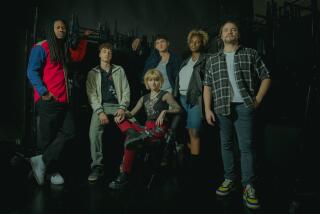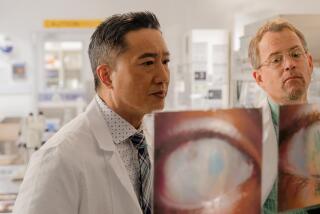Culture of the Deaf
- Share via
I found your article, “Implant Liberates the Deaf From Silence” (by John Dreyfuss, Jan. 29), to be quite a tribute to the House Ear Institute. I have been to the House Ear Institute several times and have great respect for their accomplishments in helping the deaf and hard of hearing. After reading your article, one is given the impression that the “3M House Cochlear Implant System” is the answer for a great majority of the deaf community.
My son has sensory neural deafness and, like many deaf people, this implant is useless for him. I am in no way complaining or unhappy about this because we are deeply involved with a wonderful world called the deaf community.
“Of all physical disabilities,” writes psychologist Hans Furth, “deafness is the only one that makes its members part of a natural community.” You see the deaf are not isolated and they do not live in a bottle. They have alumni associations, athletic teams, social clubs and churches that bring together the deaf community and the hearing community with the use of interpreters. I might add that many colleges, adult education centers and churches offer sign language classes, which are not filled by the deaf but by the hearing seeking to touch, for whatever reason, a part of the deaf community.
The deaf have schools. Not institutions. (I find that word archaic.) My son attends California School for the Deaf, Riverside (CSDR). Along with many students he is receiving the best education and life experience possible. Your comparison of what it costs to “keep” a student at CSDR and the cost of an implant is like comparing apples and oranges. CSDR is a residential school that is state funded at no cost to the parents. The education a child receives will benefit for a lifetime. Those who elect to have the implant need to have constant maintenance throughout their lives and no guarantee of its success. The people who receive the most benefit from this device are the “post-lingually deaf”--those who lost their hearing after they learned language and can therefore speak well without having spent years undergoing speech therapy.
Let me tell you a little about my son. He is a beautiful, bright, at times exasperating child. When I observe him playing from a distance, he is just as typical as my other children or any of the neighborhood children. He is something more special than any of us. He can express himself more quickly than any spoken word with just a shape of his hands and a lot of expression on his face. My son uses American Sign Language, a graceful and intoxicating language. Everyone in this family is committed to signing and will continue to participate in the deaf community because it is truly a giving and understanding community.
I would like to close with a little piece that was written by Anne Fadiman, a Life magazine writer, who wrote an article about the deaf at Gallaudet College in Washington, D.C. It goes like this: “Her sign language interpreter told her as they met at Gallaudet, ‘After you hang out here for a while, you’ll learn that deafness isn’t a handicap, it’s a culture.’ Fadiman dismissed the remark as overly romantic. ‘Isn’t a handicap anything that prevents a person from getting along in everyday life without special aids?’ she asked. ‘Don’t you feel as if you’re their wheelchair?’ The interpreter did not mince words. ‘No,’ she replied, ‘I’m your wheelchair.’ ”
DONNA L. PORCO
Sylmar
The article on Dr. William House’s cochlear implants is another appalling example of ignorance by medical “experts” in regard to deaf culture.
Contrary to the statement, “To many born deaf, the hearing world is threatening and alien,” many deaf people view the hearing world as part of everyday living and as an exciting challenge to surmount barriers that are placed in our paths by those who, out of sheer ignorance, fear us. Our world is not of “stony” silence but is a world filled with experience, truth and understanding.
The deaf have a strong linguistic and cultural identity, not because we “feel safer in our environment,” as Dr. House claims, but because we have a proud heritage. Would Dr. House lambaste black or Hispanic individuals, who after a long day of work with Caucasians, return to their homes and friends who may be of similar ethnic backgrounds and share certain experiences? Would he also say such individuals feel safer?
The medical profession, including Dr. House, must learn that deafness is not just a medical condition but is also a viable cultural and linguistic entity that has its place in society. We are not alienated but it is individuals such as Dr. House who alienate us.
BETTY G. MILLER, Ed.D.
West Hollywood


